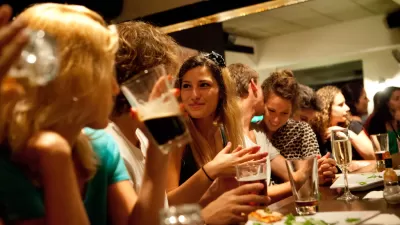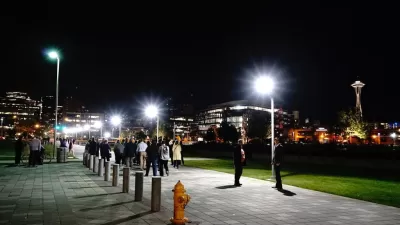Examining both sides of a debate about whether the urban revival's high-water mark is visible in the restaurant sector.

Alan Erenhalt writes a provocative article, concerned with the "limits of café urbanism." After noting that "[i]n many comeback neighborhoods, it’s a reasonable estimate that locally owned restaurants are responsible for at least three-quarters of the resurgence," Erenhalt looks for, and finds, evidence that the momentum supplied by restaurants might be starting to "peter out."
In 2016, according to one reputable study, the number of independently owned restaurants in the United States -- especially the relatively pricey ones that represent the core of café urbanism -- declined by about 3 percent after years of steady growth. The remaining ones were reporting a decline in business from a comparable month in the previous year.
Erenhalt also find anecdotal evidence to support those claims in the Clarendon district in Arlington, Virginia.
Enter Joe Cortright into the debate, countering with Erenhalt's conclusions along two lines of thinking. The first is that "café urbanism" assigns too much power to restaurants as drivers of urban revival. Second, Cortright explains, "the data clearly show that the restaurant business continues to expand. If anything, nationally, we’re in the midst of a continuing and historic boom in eating out." The central question of this debate, for Cortright, is whether the country is moving toward an "experience economy." He sees reason to believe the country is still developing as an experience economy, and urban eateries will continue to increase.
FULL STORY: The Limits of Café Urbanism

Planetizen Federal Action Tracker
A weekly monitor of how Trump’s orders and actions are impacting planners and planning in America.

San Francisco's School District Spent $105M To Build Affordable Housing for Teachers — And That's Just the Beginning
SFUSD joins a growing list of school districts using their land holdings to address housing affordability challenges faced by their own employees.

The Tiny, Adorable $7,000 Car Turning Japan Onto EVs
The single seat Mibot charges from a regular plug as quickly as an iPad, and is about half the price of an average EV.

Austin's First Single Stair Apartment Building is Officially Underway
Eliminating the requirement for two staircases in multi-story residential buildings lets developers use smaller lots and more flexible designs to create denser housing.

Atlanta Bus System Redesign Will Nearly Triple Access
MARTA's Next Gen Bus Network will retool over 100 bus routes, expand frequent service.

Toronto Condo Sales Drop 75%
In two of Canada’s most expensive cities, more condos were built than ever — and sales are plummeting.
Urban Design for Planners 1: Software Tools
This six-course series explores essential urban design concepts using open source software and equips planners with the tools they need to participate fully in the urban design process.
Planning for Universal Design
Learn the tools for implementing Universal Design in planning regulations.
Smith Gee Studio
City of Charlotte
City of Camden Redevelopment Agency
City of Astoria
Transportation Research & Education Center (TREC) at Portland State University
US High Speed Rail Association
City of Camden Redevelopment Agency
Municipality of Princeton (NJ)





























